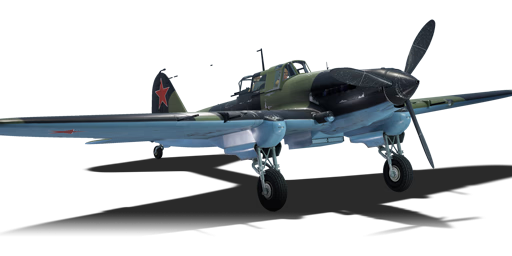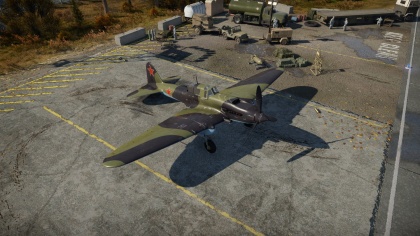Difference between revisions of "IL-2M (1943)"
m (T) |
(Edits.) |
||
| Line 212: | Line 212: | ||
'''Pros:''' | '''Pros:''' | ||
| − | * Retains the flexible payload options of | + | * Retains the flexible payload options of its predecessors |
| − | * Features a 12.7 mm Berezin in a defensive position | + | * Features a single 12.7 mm Berezin machine gun in a rear-facing defensive position |
'''Cons:''' | '''Cons:''' | ||
| − | * Plane is less agile than | + | * Plane is less agile than previous versions (heavier) |
| − | * Gunner doesn't benefit from the same level of protection as the pilot | + | * Gunner doesn't benefit from the same level of protection as the pilot |
| − | |||
== History == | == History == | ||
Revision as of 16:36, 8 May 2019
Contents
| This page is about the Soviet attacker IL-2M (1943). For other uses, see IL-2 (Family). |
Description
The IL-2M (1943) is a rank III Russian attacker
with a battle rating of 3.3 (AB/RB) and 3.7 (SB). This aircraft was introduced in Update 1.49 "Weapons of Victory".
General info
Flight Performance
| Characteristics | |||||||
|---|---|---|---|---|---|---|---|
| Stock | |||||||
| Max Speed (km/h at ?,000 m) |
Max altitude (meters) |
Turn time (seconds) |
Rate of climb (meters/second) |
Take-off run (meters) | |||
| AB | RB | AB | RB | AB | RB | ||
| ? | ? | 6500 | ??.? | ??.? | ??.? | ??.? | ??? |
| Upgraded | |||||||
| Max Speed (km/h at ?,000 m) |
Max altitude (meters) | Turn time (seconds) | Rate of climb (meters/second) |
Take-off run (meters) | |||
| AB | RB | AB | RB | AB | RB | ||
| ? | ? | 6500 | ??.? | ??.? | ??.? | ??.? | ??? |
Details
| Features | ||||
|---|---|---|---|---|
| Combat flap | Take-off flap | Landing flap | Air brakes | Arrestor gear |
| X | X | X | X | X |
| Limits | ||||
|---|---|---|---|---|
| Wing-break speed (km/h) |
Gear limit (km/h) |
Combat flap (km/h) |
Max Static G | |
| + | - | |||
| 0 | 320 | ??? | ~?? | ~? |
| Optimal velocities | |||
|---|---|---|---|
| Ailerons (km/h) |
Rudder (km/h) |
Elevators (km/h) |
Radiator (km/h) |
| < ??? | < ??? | < ??? | > ??? |
| Compressor (RB/SB) | ||
|---|---|---|
| Setting 1 | ||
| Optimal altitude | 100% Engine power | WEP Engine power |
| ?,??? m | ??? hp | ?,??? hp |
Survivability and armour
- No armour plating
- No armour glazing
- Critical components located at the front of aircraft (fuel, pilot, engine, controls)
- More fuel tanks located in wings near the fuselage
Armaments
Offensive armament
Main article: Bombs-->
Usage in the battles
Manual Engine Control
| MEC elements | ||||||
|---|---|---|---|---|---|---|
| Mixer | Pitch | Radiator | Supercharger | Turbocharger | ||
| Oil | Water | Type | ||||
| Controllable | Not controllable | Not controllable | Not controllable | Separate | Not ontrollable | Not controllable |
Modules
| Tier | Flight performance | Survivability | Weaponry | ||
|---|---|---|---|---|---|
| I | Fuselage Repair | Radiator | |||
| II | Compressor | Airframe | |||
| III | Wings Repair | Engine | |||
| IV | Engine Injection | Cover | |||
Pros and cons
Pros:
- Retains the flexible payload options of its predecessors
- Features a single 12.7 mm Berezin machine gun in a rear-facing defensive position
Cons:
- Plane is less agile than previous versions (heavier)
- Gunner doesn't benefit from the same level of protection as the pilot
History
On 21st July 1941, the lead designer of the IL-2 Sergey Ilyushin sent a request to the People's Minister of Aviation, calling for the improvement of the IL-2 by upgrading the engine to a 1,675-HP M-82 and increasing the aircraft's armour. The request was extremely urgent, considering that the rapidly advancing German troops at the time threatened serial production of the engines then used on the IL-2. Several influential Party members also called for upgrading the IL-2's engine. Another crucial change, in conjunction with the engine, called for converting the aircraft into a two-seater, based on combat experience. The second crewman would mainly deal with protecting the rear section of the Sturmovik from aerial attack, making it, in the designer's opinion, "nearly invincible". An aft fuel tank, previously installed behind the pilot in the armoured tub, was replaced with a gunner compartment under a stretched canopy, armed with a 12.7 mm (.50-cal) UBT machine gun with 280 rounds of ammunition. The gunner position, just like the pilot's, was well armoured.
Once the prototype was tested, all test pilots concluded that flight performance of the new variant was worse than that of the earlier IL-2 AM-38 variant; however, no changes in overall behaviour were noted, the armour was very effective, and no shortcomings that made flying dangerously were uncovered. Therefore, the new prototype was accepted for serial production.
Based on the two-seat Il-2, armed with Nudelman-Suranov NS-37 in conformable gun pods under the wings, instead of the 20/23 mm cannons, this version is an attempt to create an anti-tank aircraft, first used in combat during the Battle of Kursk. However, the combat effectiveness was quite low and production of the variant was limited to about 3,500. Moreover, the bomb load was decreased from 600 kg to 200 kg. It was replaced by the conventional Il-2 attackers armed with cassettes with cumulative bomblets.
Media
An excellent addition to the article will be video guides, as well as screenshots from the game and photos.
Read also
Links to the articles on the War Thunder Wiki that you think will be useful for the reader, for example,
- reference to the series of the aircraft;
- links to approximate analogues of other nations and research trees.
Sources
Paste links to sources and external resources, such as:
- topic on the official game forum;
- page on aircraft encyclopedia;
- other literature.
| USSR strike aircraft | |
|---|---|
| IL-2 | IL-2 (1941) · IL-2 (1942) · IL-2M (1943) · IL-2M type 3 · IL-2M "Avenger" · IL-2-37 · IL-2 M-82 |
| IL-8 | IL-8 (1944) |
| IL-10 | IL-10 · IL-10 (1946) |
| Pe-3 | Pe-3 (e) · Pe-3 · Pe-3bis |
| Su-2 | BB-1 · Su-2 MV-5 · Su-2 TSS-1 · Su-2 (M-82) |
| Su-6 | Su-6 · Su-6 (AM-42) · Su-6 (M-71F) |
| Su-8 | Su-8 |
| Tandem MAI | Tandem MAI |
| TIS MA | TIS MA |
| Tu-1 | Tu-1 |
| Yak-2 | Yak-2 KABB |





